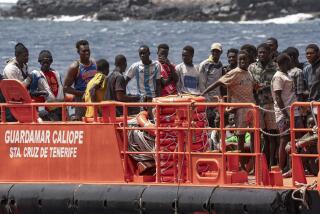Morocco-Spain Dispute No Threat
- Share via
CEUTA, Spain — Residents of this multi-ethnic Spanish enclave on the Moroccan coast of North Africa say they don’t feel threatened by the confrontation over a tiny, seemingly worthless island a few miles away in the glistening Mediterranean Sea.
“Most people here don’t care who owns that rock,” Delores Roman Perez, a 21-year-old Ceuta housewife, said Friday of the island, known in Spanish as Isla Perejil -- Parsley Island -- and in Arabic as Leila, or night.
“We all get along here -- Muslims, Jews and Indians -- and we want it to stay that way.”
Morocco’s brief occupation of the island was reversed Wednesday by Spanish troops, who escorted them off peacefully. But the diplomatic impasse remains -- and the fact that it happened at all raises concerns that it was meant to be the first step in a bid to gain control of Spanish territories along Morocco’s northern coast.
“Ceutis,” as residents of Ceuta are known, play down such fears.
“Morocco should spend its energy eradicating its own poverty instead of trying to capture bits of rock that have little value,” said Abselam Hamadi, leader of the local Islamic community.
Residents said they feel protected by Spain and just want the dispute over the rocky outcrop to be resolved quickly so they can live in peace again with their Moroccan neighbors.
Mosques and Catholic churches dot the skyline of this seven-square-mile isthmus. The hourly ringing of church bells mingles with Muslim calls for prayer.
More than half the approximately 80,000 residents are Roman Catholic. Another 30,000 are Muslim and the rest are mainly Hindus and Jews.
Ceuta is just three miles from the island both countries claim. The garrison town has been in Spanish hands for more than four centuries.
But Morocco, which became an independent nation in 1956, claims Ceuta along with a second coastal enclave, Melilla, and other tiny territories, including the island.
The situation prompts comparison with Gibraltar, a British colony across the strait on Spain’s southern tip that was ceded to England in the early 18th century. Spain and Britain are negotiating the future status of Gibraltar.
But Ceutis reject any such comparison.
“Ceuta is not like Gibraltar,” insisted Jose Perez Garrido, 74, a former Spanish army commander in Ceuta. “This is Spanish and before that it was Portuguese.... Gibraltar was once Spanish, but Ceuta was never Moroccan.”
Spain’s military power dwarfs that of Morocco’s, but there seems little likelihood the diplomatic impasse will degenerate into armed conflict.
The government of Prime Minister Jose Maria Aznar has proposed withdrawing the several dozen Spanish troops on the island if Morocco agrees not to attempt to reoccupy it.
Morocco’s response Friday was that Spain must remove its troops before any negotiations start.
“No negotiation, no discussion can take place between Spain and Morocco before there is a complete withdrawal of Spanish troops,” Foreign Minister Mohamed Benaissa said in Paris.
Compared to the grinding poverty that is found on the Moroccan mainland, Ceuta is wealthy, with hotels, classy restaurants and fashion boutiques doing a bustling business.
Conservative politicians say the city is a haven for hashish traffickers, but police say the problem is no greater than in any other Spanish city.
Around 40% of its population are either military, police or Spanish civil servants and earn more than their counterparts on the Iberian peninsula because of bonuses given to encourage people to stay in the enclave.
While tens of thousands of Moroccans cross the border every day to work or sell merchandise, Ceuta’s Muslims fill the more menial jobs mostly in tourism and construction.
More to Read
Sign up for Essential California
The most important California stories and recommendations in your inbox every morning.
You may occasionally receive promotional content from the Los Angeles Times.













